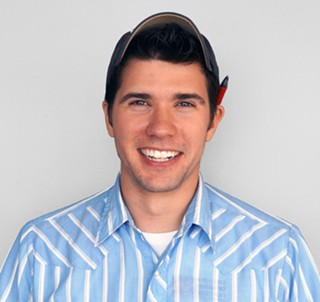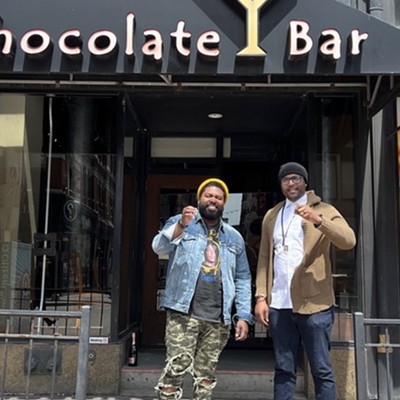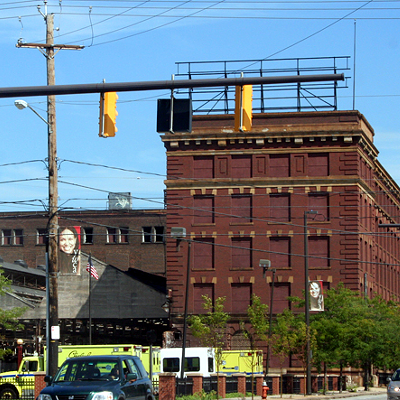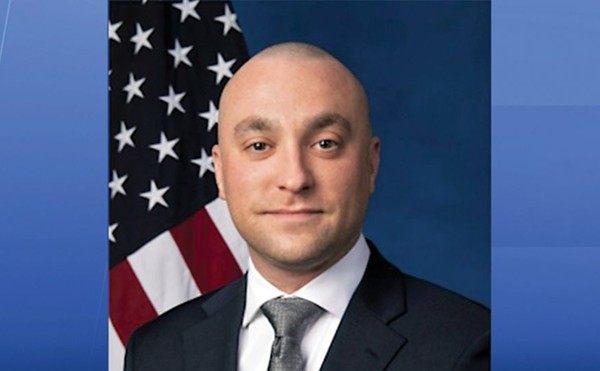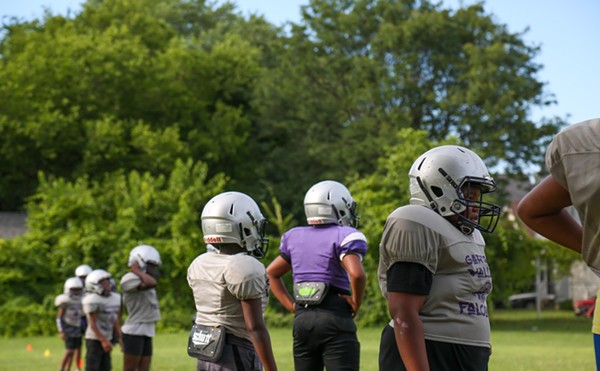One of the more noteworthy takeaways from last month's Cavaliers Youth Fund Golf Classic is this: Recent (and some might say garish) trends in NBA players' wardrobes haven't yet materially affected the tastes or habits of off-court personnel.
The assorted Cavs' PR folks down here at the Firestone Country Club in Akron, for better or worse, look like an intergenerational tennis team. They're outfitted in running shoes and sporty pants, which billow in the wake of Tyler Zeller's Ferris-wheel swings. If not to impress, they're certainly dressed to withstand: the elements, the stress, the movement of both arm and hip flexor at once. But for the time being, they're clumped outside the clubhouse and watching—doting, more like—as Mike Brown fields questions from two youngsters with microphones.
"How early do you go to bed at night?" one of them asks the Cavs' head coach.
"I'm gonna try to go to bed real early this year," Brown reports, and then asks about the kid's bedtime to jazz things up with some tit-for-tat. Brown says he'll try to go to bed, well, a little later than the kid's weekend bedtime, around 11:30.
The kid doesn't like it.
"How about 11:00?" Brown asks. "Can I go to bed at 11?"
The kid says he guesses so, but his heart's not in it.
"10:30?" Brown pleads.
The damn kid's not budging. He even starts to giggle as Brown's mouth goes agape. Can't he intuit how humiliating it is for a grown man to negotiate his schedule with anyone other than his wife?
This is, of course, dramatized for the cameras. And the media folks are happy-tsking at Brown as if he's Jesus Christ. What they understand first of all is that this guy is great with kids, a genuine sweetheart.
Secondly, but just as forcefully, they understand that Brown's not fooling anybody with his "early-to-bed" routine. This is a man who routinely takes four hours to watch two-hour game tapes, a man who honest-to-God irons his ties, a man who talks Xs and Os with sportswriters in Vegas until breakfast. Mike Brown is a teacher. And like the very best teachers, he doesn't sleep. He just keeps learning.
He looks like a giant right now, seated between these mini interlocutors, but he's still dwarfed by the species-defying Andrew Bynum, who has just arrived nearby, emerging from a golf cart the way a normal-sized man might from a microwave.
Meantime, the girl on Brown's left has eyes only for the coach. Her first question isn't even a question. She just wants to welcome him back to Cleveland.
Brown demands a hug, and she's happy to oblige.
"When I got fired in L.A., my youngest boy said to me: 'Dad are you okay?'" Brown's talking candidly on the Firestone patio later in the afternoon, looking comfy as hell in gray sweats and a navy-blue Cavs' fleece top.
"And I said, 'Yeah, you know, it's not the end of the world. This happens to people all the time. We're obviously in a much better situation than most people, so we've got to feel blessed and thank our lucky stars.' And literally the next thing out of his mouth was 'Does that mean we get to move back to Cleveland?'"
That was November 2012, a month Brown modestly calls a whirlwind. He'd just been shitcanned by the Lakers after only five regular season games into his second season. He'd posted an ugly but very, very early 1-4 record while the roster battled injuries and the utter disembowelment of team chemistry with marquee free agents Dwight Howard and Steve Nash.
But man: Talk about a snap judgement.
Brown had no personal ties to the West Coast, and after talking things over with his wife, he recognized that he and his family actually loved Cleveland—go figure, right? The people, the scenery, the weather. They had a fantastic time here during Brown's first tenure and they intended to return, to make a home here. Brown's older son Elijah, who was hotly pursued by several California colleges as a high school basketball player, re-opened his recruitment and committed to Butler. Brown's younger son Cameron was eager to rejoin his buddies at Westlake High School. It was only a matter of locking down a home before the Browns made their move official.
To make things crystal clear: Mike Brown was moving back to Cleveland whether he got the Cavaliers' head coaching job or not. He was planning to come back long before the position was even on the table. This is where he wanted to be.
As it turns out, he was offered another coaching position—ESPN reported that the offer came from godawful Phoenix—and Brown says his agent assured him of at least two other teams with potential interest, but he turned them down because of the situation in Cleveland.
"Not the situation with the Cavaliers," says Brown. "The situation of coming back."
Most Clevelanders who follow sports with any regularity or tortured sense of purpose know about Brown's credentials, but here's a primer for good measure:
After globetrotting for much of his childhood and graduating from high school in Germany—his dad was in the Air Force—Brown played college hoops in San Diego and shortly thereafter landed an internship with the Denver Nuggets. He became a full-time video guy and worked his way up the organizational ladder as go-getters tend to do.
"I embraced every opportunity," says Brown. "I never said no to anything."
He followed his mentor Bernie Bickerstaff (a current assistant in Cleveland) from the Nuggets to the Wizards, was a protege of the legendary Greg Popovich in San Antonio during Tim Duncan's statistical prime in the early aughts, and then coached under Rick Carlisle in Indiana before Dan Gilbert selected him from a mob of candidates all salivating at the prospect of coaching the Cavs, and a blossoming LeBron in 2005.
"I've probably interviewed thousands of people, Gilbert told Scene in '08 (not all of whom, presumably, were for the Cavs' gig). "Usually, a person doesn't appear to have every tool. [Brown] is one of these guys that literally, you sit down with him, you can feel the integrity, the character, the confidence, the humbleness . . . It just all came."
Brown—ever humble—says he doesn't feel like he was necessarily better than every other candidate when he was first offered the job: He was just extremely organized when he presented his ideas and demonstrated a passion for helping turn the organization around.
"I felt like I had a plan on both sides of the ball," Brown says, "and not only that, I felt like I had a plan off the court to help establish a culture here."
Which he did, in spades. Brown's tenure from '05-'10—ahem, the LeBron Era—was something of a golden age or pax romana for the franchise. Brown led the Cavaliers to five consecutive playoff appearances. In 2007, he chaperoned LeBron and the ugliest supporting roster in recent NBA memory—Donyell Marshall! Eric Snow! Drew Gooden! Larry Hughes!—to the only Finals appearance in Cavs' history. But because Brown never achieved the ultimate prize, even with LeBron, he was considered by many to be a failure.
Which is why many fans interpreted his rehiring as a mistake.
"I think the familiarity bred a little bit of contempt in this case," says former Plain Dealer Cavs' beat reporter and current ESPN writer Brian Windhorst in a phone interview. "But he's a high-profile free agent, and I don't think he ever got the credit he deserved for wanting to come back."
Given the coaching climate in the NBA—13 of the league's 30 teams will feature new head coaches this season—the demand is frequently much higher than the supply, and it's ludicrous to think that Brown's track record wouldn't stand out among the bushy-tailed former players, college coaches and longtime assistants all vying for top spots.
"So many of these teams are crapshooting," says Windhorst. "But Mike's a proven commodity. He could've probably had six job offers."
Jason Lloyd, who covers the Cavs for the Akron Beacon Journal, agrees.
"It was clear that Mike was by far the most qualified," he says. "If you're not gonna get Mike, you're gonna go with another rookie coach who's been waiting for his first job. With all that's at stake, they weren't in a position to go that route."
What's at stake, then?
It's not just Kyrie, if that's what you're thinking. Easy enough to transfer our anxiety about one franchise player to another, sure, but if we were merely trying to pacify our young stud, oughtn't we have stuck with Byron? The alleged point guard guru? Kyrie's "Basketball Father"? A man who stood with arms sternly crossed as he "coached" three of this generation's greatest: Kidd in New Jersey, Paul in New Orleans, Kyrie in Cleveland?
Just, no. No effin way.
More on Byron in a moment, but know that GM Chris Grant has spent three years tearing apart the team. ("Anyone can tear apart a team," says Windhorst. "I could trade away a team's best players and get nothing back.") In some respects the next two years represent a litmus test for his particular rebuilding strategy; it may determine whether or not he'll remain the long-term GM in Cleveland.
"If my job and my neck were on the line," says Windhorst, talking about Grant "I know I'd want a guy I knew I could work with and who's a proven commodity."
Byron Scott was supposed to be a proven commodity, by the way, the last-ditch trump card in Gilbert's effort to entice LeBron, as some saw it. Scott was not only a (mildly) successful coach. Much more importantly, he was a former player. And not just any player! A starter for the Showtime Lakers! A guy with three rings!
When it became clear that LeBron didn't much care about coaches at all—he wanted a roster optimized for a championship (and will again in 2015, folks)—everything went to hell.
At least that's how Windhorst sees it.
"When Dan woke up on July 10, 2010, and realized LeBron was gone, he might have regretted the fact that he just fired a coach who'd won 60-plus games in each of the past two seasons."
Ya think? (Gilbert admits as much, though at the time, he had this to say about jettisoning Brown: "I think it is clear that Mike Brown has been instrumental in contributing to the growth and progress we have experienced in recent years. We wish Mike and his family the best of luck in any future challenges that Mike chooses to accept going forward. After a long and deep analysis of all of the factors that led to the disappointing early ends to our playoff runs over the past two seasons, we concluded that it was time for the Cavaliers to move in a different direction. The expectations of this organization are very high and, although change always carries an element of risk, there are times when that risk must be taken in an attempt to break through to new, higher levels of accomplishment. This is one of those times.")
Scott Raab, Esquire editor-at-large and author of The Whore of Akron, was still hanging around the Cleveland Clinic Courts working on his book during Byron Scott's first year. He says Scott always treated the media with courtesy and professionalism—he was "masterful" at giving good quotes—but is certain the local media, in turn, gave him a free pass.
"At no point during his tenure am I aware of anyone calling attention to the fact that he was phoning it in night after night and season after season," Raab says.
Raab, who identifies himself as a fan first and a dabbling analyst second, says that Scott already had the reputation of being a head coach whose golf clubs were in the trunk, but that the personal drive simply wasn't there with the franchise in total rebuilding mode.
"I know he wasn't given a whole lot to work with, but the test of any coach is: Did he get the most out of what he had? And I don't think he even came close to doing that, and I don't think the media in Cleveland bothered to rouse themselves to even suggest that that was part of the problem."
Even Terry Pluto, who supports Brown, kicked off his column on the day of Brown's rehiring with the assertion that if he were GM, Byron Scott would still be head coach.
Raab, on the other hand, is fairly conclusive to the contrary: "There was no leadership that I ever saw during a game. After [the LeBron plan backfired], I don't think Byron Scott made a concerted effort to do anything but collect a paycheck."
Jason Lloyd, who admits to being a fan of Scott's, attests that there was a serious gap between what the coach said and what the players did.
"He always said the right things, always," says Lloyd. "We're gonna win with our defense, and all that, but there was never any proof. I think Byron kinda struggled to teach some of his principles, and quite honestly, I don't know what principles existed defensively."
As for Brown, he's the bona fide defensive specialist. That's always been the case, but fans can expect a complete transformation from last year's mess.
"It'll be a whole new approach," says Jason Lloyd. "Those leads they blew last season? 18? 20? 27 points? Yeah, you're not gonna see that under Mike Brown."
Lloyd jokes that he's been covering the Cavs' for three years, but this is the first chance he'll get to write about a professional basketball team. He went out to Las Vegas to cover summer league ball, and already he noticed a difference.
"On the summer league team, there's only four or five guys that even make the final roster," Lloyd says, "But Mike lined them all up on the baseline, and for the first 90 minutes of practice, they just stood there while Mike taught them defensive principles."
Imagining Brown pulling a guy out to demonstrate a position—where to put your hands, where to keep your eyes—sounds almost like CYO stuff, but Lloyd says it's teaching moments like that which are so crucial when you've got a young team. Even with the signing of veterans Jarrett Jack and Andrew Bynum (he of the golf cart clown car), the Cavs still will have one of the youngest rosters in the league.
Raab, too, suspects that Brown will be an improvement if only because he leads by example.
"Mike Brown will model the behavior he's looking for. He is as hardworking as any coach in any sport at any level. He didn't play on the Showtime Lakers, but he has an absolutely relentless work ethic. He'll walk the talk."
So what's different this time around? Brown says there was a special anxiety that came with being a young coach—an anxiety that fades with maturity—tied to the desire to be considered, by players and analysts and other coaches, "of age."
When he was hired in 2005, Brown was only 35 years old. He was the second-youngest coach in the league behind only baby-faced Lawrence Frank in New Jersey. His youth and relative inexperience was considered something of a calculated risk, and Brown says he was often fighting the perception that he was too young to do the job. He even remembers a story which illustrates his point.
"When I was an assistant in San Antonio, one of the last guys I worked out before we did our pre-game speech and and all that was Steve Kerr. And Steve's older than me by a couple years. So we played one on one. I'd always play defense and if I got a stop, I'd get a point, and if he scored a bucket, he got a point. We'd go to five, then he'd take his shots and we'd go into the locker room.
"But I'll never forget, it was a home game and we're playing, and the song 'Car Was'" from back in the '70s came on over the loudspeaker. And Steve had the ball in his hand. I'll never forget, he was pivoting, I was playing defense and he goes, 'Uh oh, I'm in trouble now, they're starting to play your jams, from back in your day,' and it kinda caught me off guard at first, but I was like 'Yes! He thinks I'm older than I am!' And what I wanted to say was, 'Steve you should know this song better than I do, you're older than me!'"
This time around, after the 2010 playoff debacle, his dismissal, The Decision, and the crucible of Los Angeles, he's returning like a war veteran—older, wiser, harder.
"I feel more confident," he says. "I feel like I have a better feel, and that there are a lot more positives this time around. I feel like my contributions will be at a higher level. I feel like I'm in my prime, and at the end of the day, this may define who I am or was as a coach."
Jason Lloyd says Brown is returning with more swagger and authority.
"He was hamstrung with LeBron and the situation there," Lloyd says. "I think you'll see that he's got more power in the locker room."
Brian Windhorst thinks we won't really be able to assess Mike Brown's improvement for some time.
"If you want your team to go from a 3 to an 8, Mike Brown's your guy," says Windhorst, referencing an imaginary 10-point scale. "But from an 8 to a 10? The answer is no. We won't know what he's learned until the playoffs."
Training camp started this week—October 1—and getting excited for the team (a truly exciting roster) is made much more difficult by the recent woes. Under Byron Scott, the Cavs tallied 64 total victories in three seasons, two less than the Miami Heat's 66 last year alone, and two less than Mike Brown's Cavaliers in '08-'09—a franchise record—the year before he was fired.
Remember that awesome summer?
Dan Gilbert calls letting Brown go a mistake. He uses catchphrases like "organizational uncertainty" to characterize what the rest of us saw as (justified) desperation after the Cavs' spectacular demise against the Celtics in the Eastern Conference Semifinals that year, a series in which the Cavs, taking their cue from LeBron, openly quit on their head coach.
Gilbert wasn't alone in thinking that LeBron's altar needed a sacrifice with Brown's name on it. But, improbable as it sounds, Gilbert and Brown's relationship wasn't strained in the least by the circumstances. He went on the record about how basketball is "a business" and his understanding of the ownership's motives.
Brown, ever the class act, was gracious in his departure that offseason. "We partnered in creating a culture and a standard that I am, and will continue to be, very proud of. None of which would be possible without the dedication and support of Dan Gilbert," he said in a statement at the time. "I am thankful for the opportunity that he gave to me and my family."
It's not like Brown and Gilbert have been texting each other pictures of their favorite meals these past three years, but the relationship has remained incredibly cordial.
"It literally feels like I went on vacation for a few weeks and now we're back to rock and roll," Brown says. He also calls Gilbert's public remorse about firing Brown "one of the biggest compliments I've ever had in my life."
What was supposed to be a re-acquaintance dinner back in April between Gilbert, Grant and Brown turned into a six-and-a-half-hour marathon chat that moved this decision quickly forward: He was introduced as head coach later that week.
"It all just came right back," says Brown. "It was too natural."
The one thing Mike Brown won't talk about at Firestone is LeBron. In fact, NBA tampering rules prohibit him from commenting on any other player currently on contract. "I'd be fined a whole bunch of money," he laughs.
LeBron was featured in the "Men's Wear" arm of Women's Wear Daily—not kidding—a couple weeks back, and said that he'll likely retire someplace where he won't have to endure cold winters.
"I've grown used to my new city's little perks like fresh fish and sweet fruit," James told the style site while modeling an exclusive new watch, for which he's a brand ambassador.
Can't blame the guy for preferring the sun, but there's something in that desire, some weakness in the constitution maybe, that smacks of his cherry picking for elite teammates to form powerhouse rosters.
"I don't want to go back to cold winters," LeBron said. He was talking about retirement destinations, but it felt like a more basic indictment of self: I don't ever want to do things the hard way.
Mike Brown, on the other hand, is a cold-weather apologist.
"As crazy as it sounds," Brown says, "we missed the snow. We missed the four seasons. It's something we complain about when we're in that time, but it's fun to have the curtains open on Christmas Eve and to look outside and there's a couple feet of snow on the ground and it's coming down and all that stuff."
Cleveland is pleased as punch to give Mike Brown a winter; and Brown just might give Cleveland a ring.

